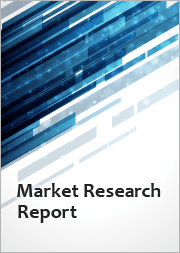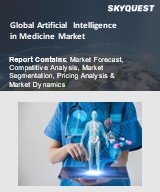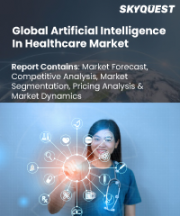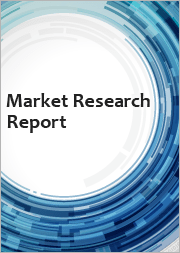
|
시장보고서
상품코드
1663320
의약품 상업화 분야 AI : 시장 인사이트, 경쟁 구도, 시장 예측(-2032년)Artificial Intelligence (AI) in Drug Commercialization - Market Insights, Competitive Landscape, and Market Forecast - 2032 |
||||||
의약품 상업화 분야 AI 시장 규모는 예측 기간 동안 연평균 24.12%의 CAGR로 성장할 것으로 예상됩니다.
만성질환의 유병률 증가는 혁신적이고 효과적인 치료법에 대한 수요를 촉진하고, AI 기반 의약품 상용화의 필요성을 가속화시키고 있습니다. 리얼월드에비던스(RWE)에 대한 관심이 높아지면서 제약사들은 AI를 맞춤형 의료에 활용하여 의약품 개발 및 시장 개척을 최적화할 수 있게 되었습니다. 또한, 기술 제공업체와 제약사 간의 협업이 증가함에 따라 AI의 통합이 가속화되고 데이터 분석 능력이 강화되어 제품화 프로세스가 간소화되고 있습니다.
시장 역학:
Global Cancer Observatory의 최신 데이터에 따르면, 2022년에는 전 세계적으로 약 2,000만 건의 신규 암 사례가 기록될 것으로 예상되며, 2045년에는 3,260만 건으로 증가할 것으로 예측됩니다. 암은 여전히 주요 사망률과 이환율의 주요 원인이기 때문에 제약사들은 정밀 암 치료제, 면역치료제, 표적 치료제 개발에 점점 더 많은 노력을 기울이고 있으며, AI는 신약개발, 임상시험 설계, 환자 분류를 강화하고 보다 신속하고 효과적인 제품화를 실현함으로써 이러한 노력에 매우 중요한 역할을 하고 있습니다. AI를 활용한 RWE(Real World Evidence) 분석을 통해 제약사들은 치료 반응에 대한 이해를 높이고, 질병 진행을 예측하며, 상업화 전략을 정교화할 수 있습니다. 또한, AI 기반 바이오마커 분석은 이상적인 환자 집단을 찾아내어 암 치료제의 시장 진입과 채택을 개선하는 데 도움이 됩니다.
암 분야 외에도 심혈관질환(CVD)도 의약품 상용화에 AI의 도입을 촉진하고 있으며, 세계심장연맹(World Heart Federation, 2024년)에 따르면 2022년에는 전 세계적으로 약 6,000만 명이 심방세동으로 고통받고 있습니다. 심방세동은 가장 흔한 부정맥 중 하나로 혈전, 심부전, 뇌졸중의 위험을 증가시키며, 심방세동 환자는 뇌졸중 발생 가능성이 5배 더 높은 것으로 알려져 있습니다. CVD의 복잡성을 고려할 때, AI는 기존 연구, 환자 기록, 임상시험 데이터를 마이닝함으로써 제약회사가 새로운 치료 옵션을 발견할 수 있게 해줄 것입니다.
세계의 의약품 상업화 분야 인공지능(AI) 시장을 조사했으며, 시장 개요, 시장 영향요인 및 시장 기회 분석, 법·규제 환경, 시장 규모 추정과 예측, 각종 부문별·지역별·주요 국가별 상세 분석, 경쟁 구도, 주요 기업 개요 등의 정보를 정리하여 전해드립니다.
목차
제1장 의약품 상업화 분야 AI 시장 보고서 : 소개
제2장 의약품 상업화 분야 AI 시장 : 주요 요약
- 시장 개요
제3장 경쟁 구도
제4장 규제 분석
- 미국
- 유럽
- 일본
- 중국
제5장 의약품 상업화 분야 AI 시장 : 주요 요인 분석
- 시장 성장 촉진요인
- 만성질환 증가
- 맞춤형 의료를 추진하는데 있어서 RWE(Real-World Evidence)의 중요성 상승
- AI를 활용한 의약품 상업화를 추진하기 위한 기술 기업과 제약회사 간의 제휴 확대
- 시장 성장 억제요인과 과제
- 프라이버시와 데이터 누설 우려
- 이해 부족과 실업 우려에 의한 AI 툴 도입에 대한 저항
- 시장 기회
- 신흥 시장의 AI 주도 의약품 상업화 전략의 도입
제6장 의약품 상업화 분야 AI 시장 : Porter's Five Forces 분석
제7장 의약품 상업화 분야 AI 시장 : 시장 평가
- 서비스 유형별
- 규제 및 법무 서비스
- 시장 접근과 가격 설정
- 마케팅과 브랜딩
- 기타
- 약물 유형별
- 소분자
- 생물학적 제제
- 상업화 단계별
- 발매 전
- 발매시
- 발매 후
- 적응증별
- 종양
- 심혈관
- 신경학
- 감염증
- 최종사용자별
- 제약·바이오테크놀러지 기업
- CRO
- 지역별
- 북미
- 유럽
- 아시아태평양
- 기타 지역
제8장 의약품 상업화 분야 AI 시장 : 기업과 제품 개요
- EVERSANA
- Lyfegen
- Syneos Health
- McKinsey & Company
- ICON plc.
- Clarivate
- Thermo Fisher Scientific Inc.
- Viseven
- ZS Associates
- Cloud Pharmaceuticals Inc.
제9장 KOL의 견해
제10장 프로젝트 접근법
제11장 DelveInsight 소개
제12장 면책사항·문의
ksm 25.03.13Artificial Intelligence (AI) in Drug Commercialization Market by Service Type (Regulatory and Legal Services, Market Access and Pricing, Marketing and Branding, and Others), Drug Type (Small Molecules and Biologics), Commercialization Stage (Pre-launch, Launch, and Post-launch), Indication (Oncology, Cardiovascular, Neurology, Infectious Disease, and Others), End-User (Pharma and Biotech Companies, Contract Research Organizations (CROs), and Others), and Geography (North America, Europe, Asia-Pacific, and Rest of the World) is expected to grow at a steady CAGR forecast till 2032 owing to the increasing prevalence of chronic diseases, the growing importance of Real-World Evidence (RWE) in driving personalized medicine, and growing collaborations among technology companies and pharmaceutical firms to advance AI-driven drug commercialization.
The artificial intelligence in drug commercialization market is estimated to grow at a CAGR of 24.12% during the forecast period from 2025 to 2032. The rising prevalence of chronic diseases is driving demand for innovative and effective treatments, fueling the need for AI-driven drug commercialization. The growing emphasis on Real-World Evidence (RWE) enables pharmaceutical companies to harness AI for personalized medicine, optimizing both drug development and market positioning. Additionally, increasing collaborations between technology providers and pharmaceutical firms are accelerating AI integration, enhancing data analytics capabilities, and streamlining commercialization processes.
Collectively, these factors are propelling the AI-driven drug commercialization market by improving decision-making, reducing costs, and expediting drug approvals, ultimately leading to more efficient and targeted healthcare solutions. As a result, the market is expected to witness significant growth during the forecast period from 2025 to 2032.
Artificial Intelligence in Drug Commercialization Market Dynamics:
According to the latest data from the Global Cancer Observatory, an estimated 20 million new cancer cases were recorded globally in 2022, with projections rising to 32.6 million cases by 2045. As cancer remains a leading cause of morbidity and mortality, pharmaceutical companies are increasingly focusing on developing precision oncology drugs, immunotherapies, and targeted treatments. Artificial Intelligence (AI) plays a pivotal role in this effort by enhancing drug discovery, clinical trial design, and patient stratification, ensuring faster and more effective commercialization. AI-driven analysis of Real-World Evidence (RWE) enables pharmaceutical firms to better understand treatment responses, predict disease progression, and refine commercialization strategies. Additionally, AI-powered biomarker analysis helps identify ideal patient populations, improving market access and adoption of cancer therapies.
Beyond oncology, cardiovascular diseases (CVDs) are also driving AI adoption in drug commercialization. According to the World Heart Federation (2024), approximately 60 million people worldwide were affected by atrial fibrillation in 2022, one of the most common forms of arrhythmia, which increases the risk of blood clots, heart failure, and stroke. Individuals with atrial fibrillation are five times more likely to suffer a stroke. AI is transforming the drug discovery and repurposing process for CVDs by analyzing large datasets to identify potential drug candidates, reducing development time and costs. Given the complexity of CVDs, AI enables pharmaceutical companies to uncover novel treatment options by mining existing research, patient records, and clinical trial data.
Moreover, AI is playing a critical role in optimizing drug pricing models by analyzing extensive datasets to identify trends and support value-based pricing structures that benefit both pharmaceutical companies and healthcare systems. By leveraging AI, companies can streamline reimbursement processes, improve patient access to innovative therapies, and enhance decision-making throughout drug commercialization. AI-driven analytics also assist firms in predicting market demand, assessing competitive landscapes, and refining launch strategies, ultimately reducing costs and expediting time-to-market for new therapies.
For instance, in January 2025, Lyfegen, a global innovator in drug market access, pricing, and rebate management, announced a transformative collaboration with EVERSANA, a leading provider of global commercial services to the life sciences industry. This partnership aims to revolutionize drug pricing and access through AI-driven insights, underscoring the technology's growing influence in the pharmaceutical landscape.
These factors collectively are expected to propel the global AI in drug commercialization market during the forecast period from 2025 to 2032 by improving efficiency, reducing costs, and enhancing patient access to innovative treatments.
However, challenges remain. Privacy and data security concerns, along with resistance to AI adoption stemming from a lack of understanding or fears of job displacement, may pose obstacles to market growth.
Artificial Intelligence in Drug Commercialization Market Segment Analysis:
Artificial Intelligence in Drug Commercialization Market by Service Type (Regulatory and Legal Services, Market Access and Pricing, Marketing and Branding, and Others), Drug Type (Small Molecules and Biologics), Commercialization Stage (Pre-launch, Launch, and Post-launch), Indication (Oncology, Cardiovascular, Neurology, Infectious Disease, and Others), End-User (Pharma and Biotech Companies, Contract Research Organizations (CROs), and Others), and Geography (North America, Europe, Asia-Pacific, and Rest of the World)
In the drug type segment of artificial intelligence (AI) in drug commercialization market, the small molecules category is expected to hold a significant share in 2024. Small molecules, characterized by their simple chemical structures and low molecular weight, have long been the backbone of pharmaceutical development, comprising the majority of approved drugs for a range of conditions, including infectious diseases, cancer, diabetes, and hypertension. Their versatility and oral bioavailability make them crucial in treating both acute and chronic diseases.
AI is playing an increasingly vital role in optimizing the commercialization of small molecule drugs by enhancing key processes:
1. Accelerated Drug Discovery & Development:
AI-powered algorithms can analyze vast datasets to identify promising small molecule candidates with greater speed and precision than traditional methods. This significantly shortens the preclinical and clinical development phases, allowing new therapies to reach the market faster.
2. Optimized Market Strategies:
AI facilitates the forecasting of market demand, price optimization, and market segmentation by leveraging big data and predictive analytics. This ensures that pharmaceutical companies can better identify optimal markets for commercialization and set competitive pricing strategies.
3. Enhanced Supply Chain Management:
AI-driven tools help anticipate and mitigate supply chain disruptions, ensuring that small molecule drugs are delivered to the right markets and patients efficiently.
4. Personalized Marketing Approaches:
AI enables targeted outreach to healthcare professionals and patients through data-driven marketing strategies. This personalized approach aids in raising awareness and boosting adoption rates of small molecule therapies across diverse regions.
As AI technology continues to evolve, its integration into drug commercialization processes is expected to deepen, helping pharmaceutical companies streamline operations, improve patient outcomes, and enhance market competitiveness.
Thus, these factors collectively are expected to drive growth in the small molecules segment, thereby boosting the overall artificial intelligence in drug commercialization market globally during the forecast period.
North America is expected to dominate the overall artificial intelligence in drug commercialization market:
North America is expected to hold the largest share of artificial intelligence (AI) in drug commercialization market in 2024. This dominance is attributed to the region's robust biotechnology and pharmaceutical industries, advanced healthcare infrastructure, and significant investments in AI research and development. The high prevalence of chronic diseases further drives the demand for AI-driven drug commercialization solutions.
According to GLOBOCAN (2022), North America reported approximately 2.67 million new cancer cases, with projections indicating a rise to 3.83 million by 2045. AI-powered platforms leverage genomic profiles and Real-World Evidence (RWE) from regional patient data to optimize drug discovery, pricing models, and regulatory processes. The region's strong healthcare ecosystem and ongoing collaborations between pharmaceutical companies and AI developers are accelerating commercialization timelines.
AI's integration into precision medicine is particularly impactful in oncology, enabling the identification of biomarkers, patient stratification, and the development of targeted therapies that improve treatment efficacy and accessibility. The synergy between the rising cancer burden and AI's capabilities has established a strong growth trajectory for the market.
Further reflecting this trend, in March 2024, Tonix Pharmaceuticals Holding Corp. partnered with EVERSANA(R), a leading provider of global commercialization services, to support the launch strategy and commercial planning for Tonmya(TM) (TNX-102 SL), a drug under development for fibromyalgia in the U.S. market. This collaboration highlights the increasing reliance on AI-driven strategies in pharmaceutical commercialization, enhancing efficiency, patient targeting, and overall market success.
Thus, all these factors are expected to propel the growth of the artificial intelligence in drug commercialization market in North America during the forecast period from 2025 to 2032.
Artificial Intelligence in Drug Commercialization Market Key Players:
Some of the key market players operating in the artificial intelligence in drug commercialization market include EVERSANA, Lyfegen, Syneos Health, McKinsey & Company, ICON plc., Clarivate., Thermo Fisher Scientific Inc., Viseven, ZS Associates, Cloud Pharmaceuticals Inc., and others.
Recent Developmental Activities in the Artificial Intelligence in Drug Commercialization Market:
- In October 2024, RTI Health Solutions (RTIHS) and Global Pricing Innovations (GPI) announced a strategic collaboration to enhance decision-making and support in drug commercialization. They integrated data seamlessly from clinical development to post-launch, enabling robust insights and optimized market access strategies. By leveraging advanced analytics, they facilitated rapid, data-driven decisions. Their expertise in market access, pricing, and regulatory navigation improved execution speed, HTA submissions, and reimbursement strategies, ensuring successful drug commercialization.
- In July 2024, IntegriChain announced the acquisition of Federal Compliance Solutions (FCS), strengthening its expertise in government pricing and payer/provider contracting amid increasing Pharma outsourcing and regulatory changes. This combination enhanced their technology, personnel, and processes to support more profitable drug commercialization strategies, improve daily business decision-making, and optimize net revenue controls amid growing price concessions.
Key Takeaways From the Artificial Intelligence in Drug Commercialization Market Report Study
- Market size analysis for current artificial intelligence in drug commercialization size (2024), and market forecast for 8 years (2025 to 2032)
- Top key product/technology developments, mergers, acquisitions, partnerships, and joint ventures happened over the last 3 years.
- Key companies dominating artificial intelligence in drug commercialization market.
- Various opportunities available for the other competitors in the artificial intelligence in drug commercialization market space.
- What are the top-performing segments in 2024? How these segments will perform in 2032?
- Which are the top-performing regions and countries in the current artificial intelligence in drug commercialization market scenario?
- Which are the regions and countries where companies should have concentrated on opportunities for artificial intelligence in drug commercialization market growth in the coming future?
Target Audience Who Can Benefited From This Artificial Intelligence in Drug Commercialization Market Report Study
- Artificial intelligence in drug commercialization product providers
- Research organizations and consulting companies
- Artificial intelligence in drug commercialization -related organizations, associations, forums, and other alliances
- Government and corporate offices
- Start-up companies, venture capitalists, and private equity firms
- Distributors and traders dealing in artificial intelligence in drug commercialization
- Various end-users who want to know more about artificial intelligence in drug commercialization market and the latest technological developments in the artificial intelligence in drug commercialization market.
Frequently Asked Questions for the Artificial Intelligence in Drug Commercialization Market:
1. What is artificial intelligence in drug commercialization?
- Artificial intelligence in drug commercialization refers to the use of advanced AI technologies, such as machine learning, natural language processing, and predictive analytics, to accelerate and optimize drug commercialization. Drug commercialization, enhances marketing strategies, pricing models, real-world evidence generation, and patient engagement, ultimately improving drug accessibility, efficacy, and market success.
2. What is the market for artificial intelligence in drug commercialization?
- The artificial intelligence in drug commercialization market is estimated to grow at a CAGR of 24.12% during the forecast period from 2025 to 2032.
3. What are the drivers for the global artificial intelligence in drug commercialization market?
- The increasing prevalence of chronic diseases is driving demand for innovative and effective treatments, fueling the need for AI-driven drug commercialization. The growing importance of Real-World Evidence (RWE) enables pharmaceutical firms to leverage AI for personalized medicine, optimizing drug development and market positioning. Additionally, rising collaborations between technology companies and pharmaceutical firms are accelerating AI integration, enhancing data analytics, and streamlining commercialization processes. Collectively, these factors are propelling the AI-driven drug commercialization market by improving decision-making, reducing costs, and expediting drug approvals, ultimately leading to more efficient and targeted healthcare solutions. Thus, all the factors mentioned above collectively contribute to the positive growth of artificial intelligence in drug commercialization market during the forecast period from 2025 to 2032.
4. Who are the key players operating in the global artificial intelligence in drug commercialization market?
- Some of the key market players operating in artificial intelligence in drug commercialization are EVERSANA, Lyfegen, Syneos Health, McKinsey & Company, ICON plc., Clarivate., Thermo Fisher Scientific Inc., Viseven, ZS Associates, Cloud Pharmaceuticals Inc., and others.
5. Which region has the highest share in the global artificial intelligence in drug commercialization market?
- North America is expected to account for the highest proportion of artificial intelligence in drug commercialization market in 2024, out of all regions. This is due to its strong presence in the biotechnology and pharmaceutical industries. Additionally, high prevalence of chronic diseases, advanced healthcare infrastructure, and significant investment in AI research and development are further boosting the market growth.
Table of Contents
1. Artificial Intelligence in Drug Commercialization Market Report Introduction
- 1.1. Scope of the Study
- 1.2. Market Segmentation
- 1.3. Market Assumption
2. Artificial Intelligence in Drug Commercialization Market Executive Summary
- 2.1. Market at Glance
3. Competitive Landscape
4. Regulatory Analysis
- 4.1. The United States
- 4.2. Europe
- 4.3. Japan
- 4.4. China
5. Artificial Intelligence in Drug Commercialization Market Key Factors Analysis
- 5.1. Artificial Intelligence in Drug Commercialization Market Drivers
- 5.1.1. Increasing prevalence of chronic diseases
- 5.1.2. The growing importance of Real-World Evidence (RWE) in driving personalized medicine
- 5.1.3. Growing collaborations among technology companies and pharmaceutical firms to advance AI-driven drug commercialization.
- 5.2. Artificial Intelligence in Drug Commercialization Market Restraints and Challenges
- 5.2.1. Privacy and data breaching concerns
- 5.2.2. Resistance to adopting AI tools due to lack of understanding or fear of job displacement
- 5.3. Artificial Intelligence in Drug Commercialization Market Opportunities
- 5.3.1. Adoption of AI-driven drug commercialization strategies in emerging markets
6. Artificial Intelligence in Drug Commercialization Market Porter's Five Forces Analysis
- 6.1. Bargaining Power of Suppliers
- 6.2. Bargaining Power of Consumers
- 6.3. Threat of New Entrants
- 6.4. Threat of Substitutes
- 6.5. Competitive Rivalry
7. Artificial Intelligence in Drug Commercialization Market Assessment
- 7.1. By Service Type
- 7.1.1. Regulatory and Legal Services
- 7.1.2. Market Access and Pricing
- 7.1.3. Marketing and Branding
- 7.1.4. Others
- 7.2. By Drug Type
- 7.2.1. Small Molecules
- 7.2.2. Biologics
- 7.3. By Commercialization Stage
- 7.3.1. Pre-launch
- 7.3.2. Launch
- 7.3.3. Post-launch
- 7.4. By Indication
- 7.4.1. Oncology
- 7.4.2. Cardiovascular
- 7.4.3. Neurology
- 7.4.4. Infectious Disease
- 7.4.5. Others
- 7.5. By End-User
- 7.5.1. Pharma and Biotech Companies
- 7.5.2. Contract Research Organizations (CROs)
- 7.5.3. Others
- 7.6. By Geography
- 7.6.1. North America
- 7.6.1.1. United States Artificial Intelligence in Drug Commercialization Market Size in USD Million (2022-2032)
- 7.6.1.2. Canada Artificial Intelligence in Drug Commercialization Market Size in USD Million (2022-2032)
- 7.6.1.3. Mexico Artificial Intelligence in Drug Commercialization Market Size in USD Million (2022-2032)
- 7.6.2. Europe
- 7.6.2.1. France Artificial Intelligence in Drug Commercialization Market Size in USD Million (2022-2032)
- 7.6.2.2. Germany Artificial Intelligence in Drug Commercialization Market Size in USD Million (2022-2032)
- 7.6.2.3. United Kingdom Artificial Intelligence in Drug Commercialization Market Size in USD Million (2022-2032)
- 7.6.2.4. Italy Artificial Intelligence in Drug Commercialization Market Size in USD Million (2022-2032)
- 7.6.2.5. Spain Artificial Intelligence in Drug Commercialization Market Size in USD Million (2022-2032)
- 7.6.2.6. Rest of Europe Artificial Intelligence in Drug Commercialization Market Size in USD Million (2022-2032)
- 7.6.3. Asia-Pacific
- 7.6.3.1. China Artificial Intelligence in Drug Commercialization Market Size in USD Million (2022-2032)
- 7.6.3.2. Japan Artificial Intelligence in Drug Commercialization Market Size in USD Million (2022-2032)
- 7.6.3.3. India Artificial Intelligence in Drug Commercialization Market Size in USD Million (2022-2032)
- 7.6.3.4. Australia Artificial Intelligence in Drug Commercialization Market Size in USD Million (2022-2032)
- 7.6.3.5. South Korea Artificial Intelligence in Drug Commercialization Market Size in USD Million (2022-2032)
- 7.6.3.6. Rest of Asia-Pacific Artificial Intelligence in Drug Commercialization Market Size in USD Million (2022-2032)
- 7.6.4. Rest of the World (RoW)
- 7.6.4.1. Middle East Artificial Intelligence in Drug Commercialization Market Size in USD Million (2022-2032)
- 7.6.4.2. Africa Artificial Intelligence in Drug Commercialization Market Size in USD Million (2022-2032)
- 7.6.4.3. South America Artificial Intelligence in Drug Commercialization Market Size in USD Million (2022-2032)
- 7.6.1. North America
8. Artificial Intelligence in Drug Commercialization Market Company and Product Profiles
- 8.1. EVERSANA
- 8.1.1. Company Overview
- 8.1.2. Company Snapshot
- 8.1.3. Financial Overview
- 8.1.4. Product Listing
- 8.1.5. Entropy
- 8.2. Lyfegen
- 8.2.1. Company Overview
- 8.2.2. Company Snapshot
- 8.2.3. Financial Overview
- 8.2.4. Product Listing
- 8.2.5. Entropy
- 8.3. Syneos Health
- 8.3.1. Company Overview
- 8.3.2. Company Snapshot
- 8.3.3. Financial Overview
- 8.3.4. Product Listing
- 8.3.5. Entropy
- 8.4. McKinsey & Company
- 8.4.1. Company Overview
- 8.4.2. Company Snapshot
- 8.4.3. Financial Overview
- 8.4.4. Product Listing
- 8.4.5. Entropy
- 8.5. ICON plc.
- 8.5.1. Company Overview
- 8.5.2. Company Snapshot
- 8.5.3. Financial Overview
- 8.5.4. Product Listing
- 8.5.5. Entropy
- 8.6. Clarivate
- 8.6.1. Company Overview
- 8.6.2. Company Snapshot
- 8.6.3. Financial Overview
- 8.6.4. Product Listing
- 8.6.5. Entropy
- 8.7. Thermo Fisher Scientific Inc.
- 8.7.1. Company Overview
- 8.7.2. Company Snapshot
- 8.7.3. Financial Overview
- 8.7.4. Product Listing
- 8.7.5. Entropy
- 8.8. Viseven
- 8.8.1. Company Overview
- 8.8.2. Company Snapshot
- 8.8.3. Financial Overview
- 8.8.4. Product Listing
- 8.8.5. Entropy
- 8.9. ZS Associates
- 8.9.1. Company Overview
- 8.9.2. Company Snapshot
- 8.9.3. Financial Overview
- 8.9.4. Product Listing
- 8.9.5. Entropy
- 8.10. Cloud Pharmaceuticals Inc.
- 8.10.1. Company Overview
- 8.10.2. Company Snapshot
- 8.10.3. Financial Overview
- 8.10.4. Product Listing
- 8.10.5. Entropy






